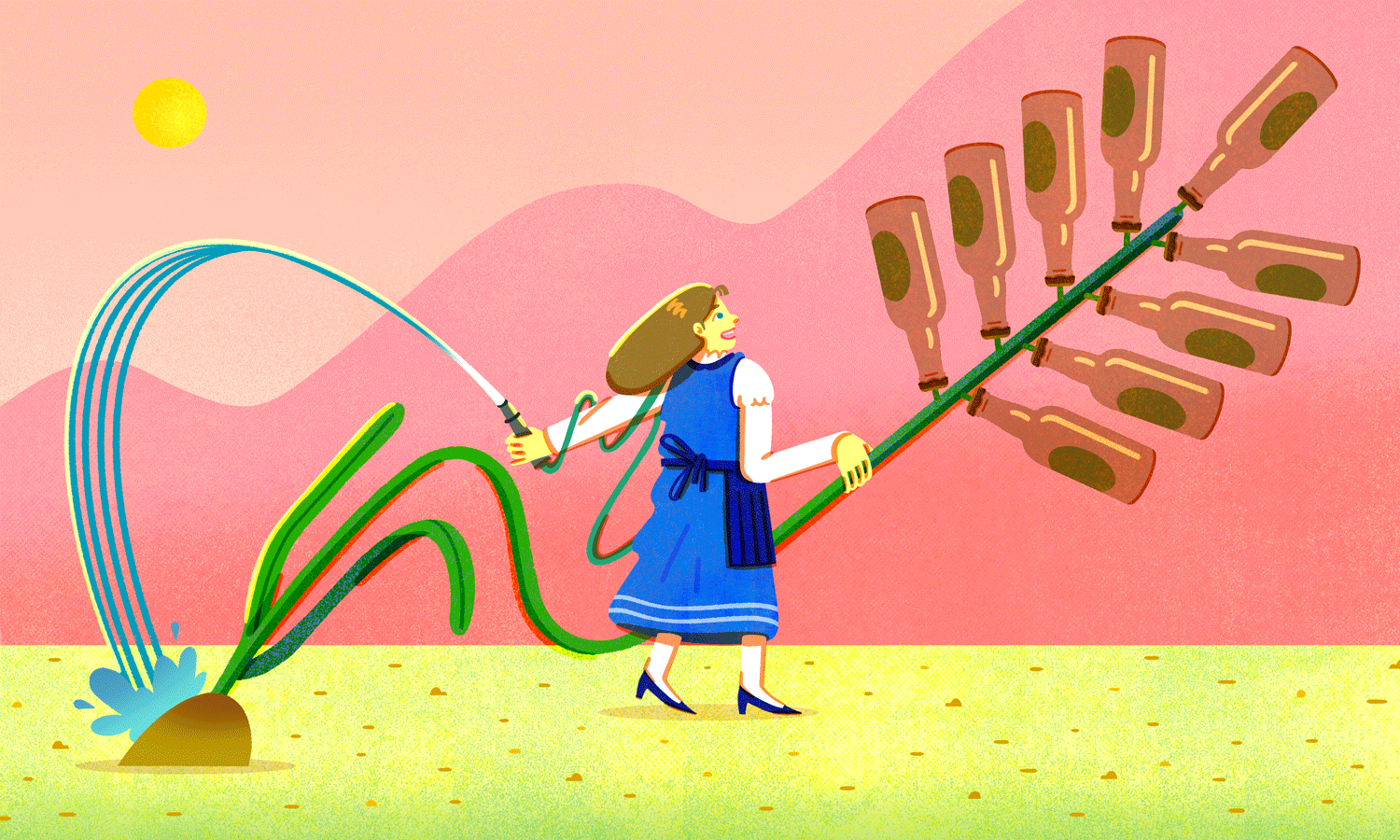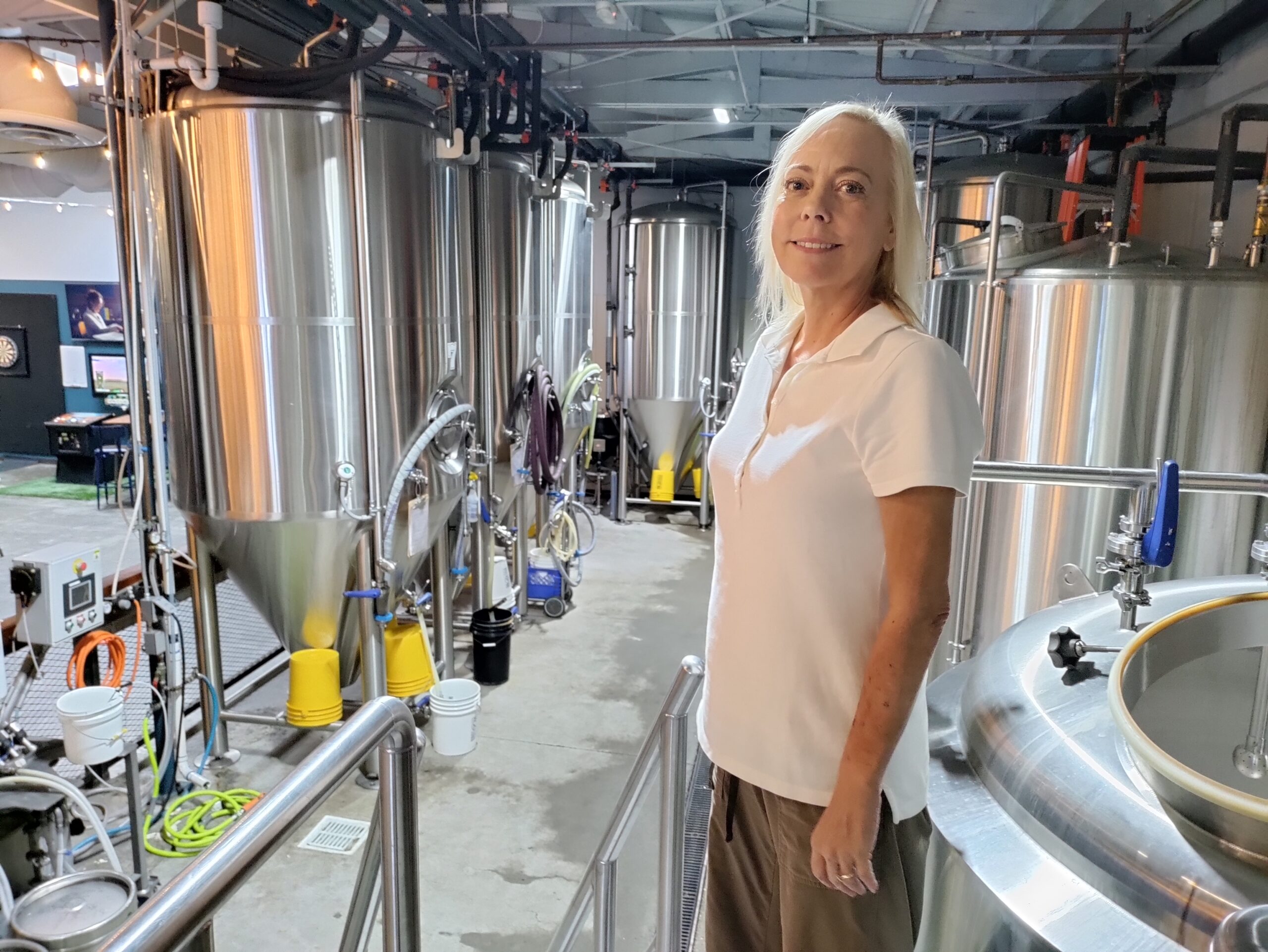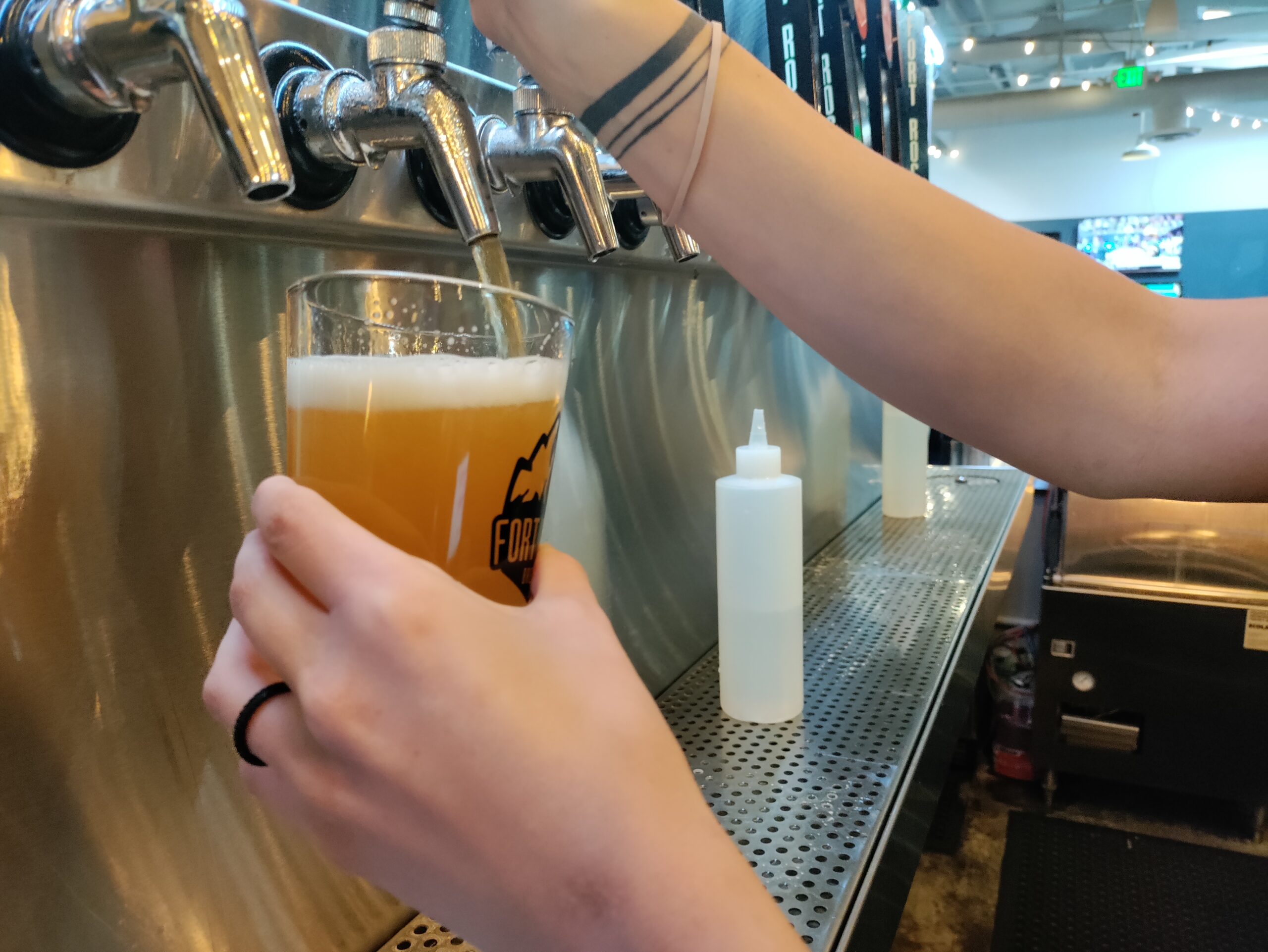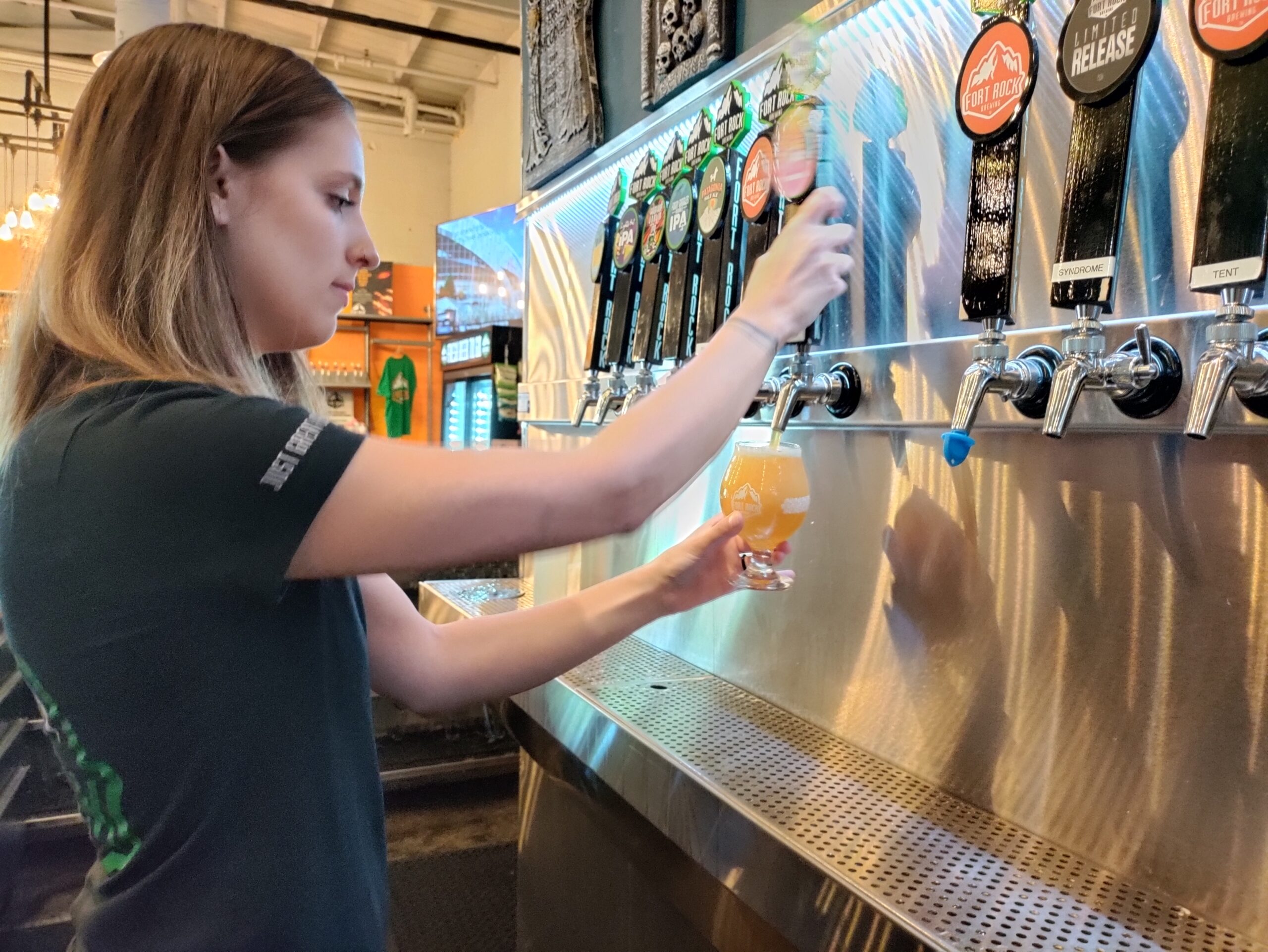
The
Impact
of
Climate Change
YUNYI DAI / NEXTGENRADIO
Matt Linder speaks with Heidi Wilder, co-owner and founder of Fort Rock Brewing Company, a brewery in Rancho Cordova. The brewery is well-known for its Folsom Dam Good Pilsner. Wilder is worried about the quality of water to make her beer. Climate change has altered the way beer gets into her customer’s hands and it’s making her rethink the future of her business.
Fort Rock Brewing Company braces for climate change
Rancho Cordova brewery owner worries about water shortages
Click here for audio transcript
Hi, I’m Matt Linder with NPR’s NextGen Radio in Sacramento.
Fort Rock Brewing Company in Rancho Cordova… is known for its Folsom Dam Good Pilsner.
Co-owner Heidi Wilder is worried about the quality of water to make her beer.
Climate change has altered the way beer gets into her customer’s hands.
It’s making her the future of her business.
[00:00:00] Heidi Wilder: Well, here’s the guy that talked us into opening a brewery. Hi, how are you?
[00:00:05] Big Mike: I’m just got the best pils in America.
[00:00:07] Heidi Wilder: Thank you
[00:00:09] Heidi Wilder: Yeah Big Mike is the beer judge that talked us, not didn’t talk us into it, but he encouraged us.
[00:00:16] Heidi Wilder: Hi, my name’s Heidi Wilder. I’m the director of Funtivities at Fort Rock Brewing in Rancho Cordova, California.
[00:00:24] Heidi Wilder: And we’ve been open for five and a half years now. And well, it’s been going swimmingly.
[00:00:32] Heidi Wilder: It’s funny because I lived in Germany for five years and so I got really well versed with beer.
[00:00:39] Heidi Wilder: We feel that climate change has affected us
[00:00:41] Heidi Wilder: You know, there’s beer is made with water, grain, hops, and yeast. Okay? Those are the four ingredients.
[00:00:50] Heidi Wilder: So water is a very key, you know, ingredient. And so, there’s a drought. What’s gonna happen to the water? Is it gonna get more expensive? Is it going to change the chemistry of the water? Is it they’re gonna have more minerals in it? You know, Folsom Lake, we get our water from there.
[00:01:08] Heidi Wilder: So this is our, our Folsom Dam Good Pilsner that I’m pouring right now.
[00:01:12] Heidi Wilder: And our 20 ounce pour in our beautiful pilsner glass with a nucleated bottom. It helps push all the aromas up and gets rid of a lot of the bloating in your belly.
[00:01:25] Heidi Wilder: You know, it’s gonna get rid of a lot of the bubbles. So you drink more beer.
[00:01:29] Heidi Wilder: What if there’s no snow pack that’s melting into Folsom Lake and all the water rights go down to, irrigate all the farms?
[00:01:36] Heidi Wilder: So we don’t know what would happen then. And again, we’d have to keep getting the water tested to make sure that we are changing our water to make sure that it stays consistent.
[00:01:48] Heidi Wilder: Like the pilsner for instance, you can’t hide any sins in a pilsner. And so if the water has to be super clean and nice and soft and if you’re not using soft water, then hmm, it’s not gonna work.
[00:02:00] Heidi Wilder: And so there’s several beers in process right now, different stages. And we just, you know, let the yeast do their thing and hopefully they finish in time. Then we can package it and sell it and make people happy hopefully.
[00:02:14] Heidi Wilder: A lot of stainless steel here. So it’s always very shiny and clean, ideally. And so we have our 15 barrel brew house, and that’s where we make the sticky hoppy water. And then the yeast finish it off for us.
[00:02:30] Heidi Wilder: So this is why we need consistency in our ingredients, because you want, you know, the pilsner to taste like the pilsner.
[00:02:38] Heidi Wilder: We’ve been affected by climate change, mostly because of the fires.
[00:02:43] Heidi Wilder: In South Lake Tahoe, it’s smokey, it’s miserable. Everybody just gets out if they have to be evacuated.
[00:02:49] Heidi Wilder: We can’t even deliver beer up to South Lake because all the roads have to be open for the fire crews. So we just, you know, settle down and be like, Okay, well I guess we’re not selling any beer and that in whatever region it is.
[00:03:22] Heidi Wilder: I think it was three years ago, it was particularly bad. And it was a little smoky down here and everything. Even people were just staying inside in their homes. They weren’t even coming to the tap room. It’s just, you know, unfortunate and it’s just, it’s so sad that we actually have a fire season now.
[00:03:18] Heidi Wilder: But you know, we’re always having to look at what’s the plan for the next, you know, five years, what’s the plan for the next year kind of thing. We always have to look forward and be, say, Okay. What’s going to happen if and be prepared.
[00:03:29] Heidi Wilder: You know, everybody had to pivot during Covid and get creative and how they could sell beer. You know, that’s might be another pivot.
[00:03:35] Heidi Wilder: Yeah. We currently don’t have any plans to mitigate climate change on our business yet. But now you bring it up. I think we should.
Heidi Wilder, director of “funtivities” at Fork Rock Brewing Company in Rancho Cordova, Calif., is worried about accessing quality water to make beer.
“Water is a very key ingredient,” Wilder said. “There’s a drought. What’s going to happen to the water? Is it going to get more expensive? Is it going to change the chemistry of the water? Is it going to have more minerals in it? I mean, what’s going to happen with the lake? Folsom Lake, we get our water from there.”
Fort Rock Brewing started as a group of homebrewers. Their friends encouraged them to open a brewery because their homebrew was so delicious. So Heidi and her husband, Tom Wilder, along with other partners, including her sister and brother-in-law, opened Fort Rock Brewing in 2017.
Heidi was a Trader Joe’s employee who loved her job. She said taking that leap into owning a brewery was something she was hesitant about.
“And so finally about a year after we were open, my husband was like, ‘You need to quit your job. You need to come work full time.’ And I was like, ‘Uh, fine,’” Wilder said.
Their brewery is one of 70 in the Sacramento area. If drought water restrictions heighten, breweries will be low on the priority list for accessing water. So far, there haven’t yet been water restrictions in place, but that is a future concern for the brewery when it comes to climate change.
Wilder said the biggest impacts they’ve already experienced are due to climate-driven wildfires and supply issues with pilsner grain. Smoke from the wildfires causes people to evacuate from areas where Fort Rock sells beer, and they lose sales. Wilder said fire evacuations in South Lake Tahoe kept them from being able to get beer into their customers’ hands.
“We can’t even make deliveries up there because we have to keep the roads open for the crews for the fire,” Wilder said.
California wildfire evacuations aside, climate change in Europe made it difficult for Wilder’s Minnesota supplier to obtain pilsner grain. The grain comes from Germany, which produced a smaller crop in 2022 because of drought conditions.
Breweries like Fort Rock rely on that specific strain of malt that gives pilsners their distinctive flavor. Thankfully, the brewery was able to obtain the needed grains and produce their signature pilsner. But Wilder worries about the future of their pilsner flavor.
“And so, is it going to be the same style or the same integrity of grain, or is it going to change?”
Climate change is making Wilder wonder whether she will be able to continue making beer in the same way. She worries about the lack of availability of ingredients that could cause flavor changes to her pilsner. Wildfire evacuations in resort areas mean fewer beer sales. And, future water shortages could drive up the price of that important resource.
“We don’t have any plans to mitigate climate change on our business—yet,” Wilder said. “But, now that you bring it up, I think we should.”

Heidi Wilder, co-owner and founder of Fort Rock Brewing, stands in front of stainless steel beer barrels. As the Director of Funtivities, she organizes activities at the brewery.
MATT LINDER / NEXTGENRADIO

Fort Rock Brewing’s Folsom Dam Good Pilsner is the reason why Heidi Wilder and her co-owners opened the brewery.
MATT LINDER / NEXTGENRADIO

Leah Scanlan, a bartender at Fort Rock Brewing, pours the brewery’s signature beer, Folsom Dam Good Pilsner. The pilsner’s success is the reason why Heidi Wilder and her co-owners opened the brewery.
MATT LINDER / NEXTGENRADIO